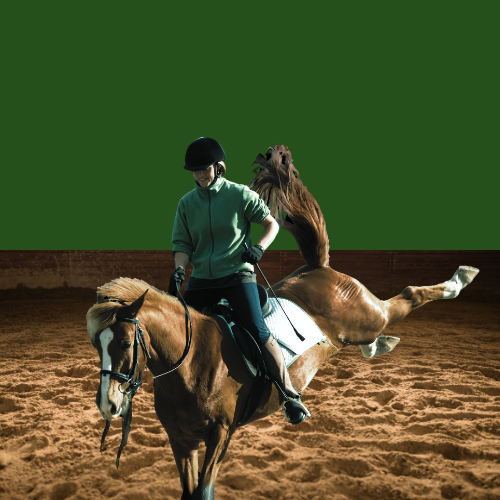If your horse is bucking in the school, it’s crucial to identify the underlying cause, which could range from pain or discomfort to a lack of understanding or simply a playful attitude, and address it accordingly.
When a horse bucks, it lowers its head and raises its hindquarters, often kicking out with its hind legs.
Body Language
A horse that is about to buck will often lower its head, arch its back, and raise its hindquarters.
Stiffening:You might feel the horse’s body become very stiff and tense, as if it’s bracing itself.
Here’s a breakdown of potential reasons and how to respond:
1. Pain or Discomfort:
- Physical Issues:Bucking can be a sign of pain, such as a poorly fitted saddle, sore back, or dental problems.
- Action:Have the saddle checked by a professional, consult with a veterinarian or farrier about potential dental issues, and consider back work with a qualified equine physiotherapist.
- Teeth:Horses with dental issues may buck as a way to communicate their discomfort.
2. Misunderstanding or Lack of Training:
- Green Horse: A young or inexperienced horse might buck out of fear or confusion.
- Action: Focus on consistent training, clear communication, and positive reinforcement.
- Communication: Ensure you are using clear and consistent aids and signals.
3. Misbehaviour or Testing Boundaries:
- Testing:Some horses may buck to test their rider’s authority or to get out of a situation they don’t like.
- Action:Maintain a firm but fair approach, and ensure you are a confident and consistent leader.
- Don’t Reinforce:Avoid rewarding bucking behavior, even if it seems like you are “giving in”.
4. Excitement or Playfulness:
- High Energy:A horse that is overly energetic might buck out of excitement or as a way to release pent-up energy.
- Action:Provide adequate turnout and exercise to burn off excess energy before riding, and consider using a lunge line or other activities to tire the horse out before mounting.
5. What to Do During a Buck:
- Stay Calm: If your horse starts bucking, try to stay calm and relaxed.
- Maintain Balance: Focus on staying centered and balanced in the saddle.
- Use Aids Correctly: Use your reins, legs, and seat aids to help guide and control the horse.
- One Rein Stop: If the horse is bucking, try a one rein stop, bending the horse’s head and neck to one side and disengaging the hindquarters.
- Dismount if Necessary: If you feel unsafe, it’s okay to dismount and assess the situation.
6. Seeking Professional Help:
- Horse Trainer: If you are struggling to manage bucking behavior, seek guidance from a qualified horse trainer or equine behaviorist.
- Vet: If you suspect pain or medical issues, consult with a vet.
Galaxy often bucks me off.
I had the vet out, saddle checked, bridle and bit and he has regular physio and dentist.
I have worked out he bucks because of point 2 above Misunderstanding or Lack of Training and 3 Misbehaviour or Testing Boundaries. This is not his lack of training it is mine. I am extremely nervous and need more lessons to help me communicate with him better. He does not do it with other more confident riders and he knows he cannot test his authority with.
My plan is to have more riding lessons at the equestrian centre with a more experienced rider riding Galaxy until we are better matched.

